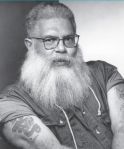With Rush, Forget Ayn Rand; Think Samuel R. Delany
When it comes to talk about Neil’s early influences on his lyric-writing, much of the focus is on Ayn Rand, but one writer who also had a big impact on Neil, by his own admission, is Samuel R. Delany, the American writer who made a big splash in the late 1960s and much of the 1970s with his science fiction novels before turning his attention to other genres.
There are arguably two novels of Delany’s that play roles in some of Rush’s key early pieces, and these are Babel-17 from 1966 and Nova
from 1967.
Babel-17 is built around a fascinating storyline in which we see how language changes the way we perceive the world. In the story, two futuristic societies are at war and one of the societies develops a false language. As people from the other side learn it, the language changes how they relate to the world and eventually they become traitors. You immediately think of George Orwell’s books, Animal Farm and 1984, and their focus on the way centrally controlled governments (and religions) use language to infantilize their populations.
In Delany’s book, the language-trick is broken by an officer (a beautiful female officer, as it happens) who realizes what’s happening to her and, like Odysseus against Circe, she’s able to break the hold the language has on her with the help of others and fight back.
You can see the parallels with Ayn Rand and her obsession with the strong-minded individual fighting back against a centrally led collectivist society, and of course you also see the parallels with Rush’s “Anthem” and “2112,” among others, although the big difference with Rand and Delany and “2112” is that the protagonist in Rush’s song doesn’t succeed.
The parallels are particularly obvious in Nova, which has been called a space opera. It’s about a highly technologically controlled future society, much like what we see in “2112,” but despite the technology, major decisions by the leaders are made superstitiously, on the basis of tarot card readings. You can suppose Neil was channeling this idea by making the leaders in “2112” priests (in the Temple of Syrinx), with their relationship to faith and belief rather than to reason.
In any case, the main character of Nova is a young man called Mouse who uses a device called a syrynx to create music and bring stories to life, kind of like a chinese lantern (an image that you can argue figures into Clockwork Angels). Like Babel-17, and like “2112,” the broader story is based on two communities at war with one another over economic dominance, with one side led by the Red family, so you can see it referencing Rand’s battle between the commies and the capitalists.
There’s a third Delany novel that’s worth mentioning, Dhalgren, which came out in 1975, that’s about a town that’s been completely cut off from the outside world and strange things constantly happen, including the appearance of twin moons, which is an image referenced in “2112.” Dhalgren is such a strange novel that it’s hard to know what’s really going on and what it all means, but the town, called Bellona, strikes an interesting contrast to Galt’s Gulch, which is the idealized community of capitalists in Ayn Rand’s Atlas Shrugged
.
The two communities couldn’t be more different. Galt’s Gulch is well-ordered and thriving because it was created by strong individualists who base everything on verifiable reality and treat each other with respect and dignity; Bellona is ephemeral, a chimera of a community that became isolated by a freak accident and whose inhabitants are as mysterious to one another as they are to themselves. It would be a living hell to someone like Rand.
When you put all of this together, what you get in some of Rush’s most important early songs is a mish-mash of influences from these two important writers. One of the interesting things about Rush’s music is the way it always moves in new directions, lyrically and musically, and Neil has said over and over again that he was interested in these ideas when he was young but he long ago moved on from them. It’s interesting, though, to think about Delany’s ideas along with Rand’s when you listen to some of Rush’s earlier music, particularly “2112” and “Anthem.”—Rob Freedman, Rush Vault
More on Rush, Rand, and libertarianism:
One Year Later, is Rand Paul Still Rocking to Rush?
The Trees: More Than Meets the Eye?
The ‘Rand’omness of Rush’s Libertarianism
Neil’s Left-Libertarianism: What’s It all About?
We Have Met the NME and It Is Capitalism
 Here’s a fun piece of satire on how Rush and other Canadians unleashed Ayn Rand on the United States in an effort to destabilize the country.
Here’s a fun piece of satire on how Rush and other Canadians unleashed Ayn Rand on the United States in an effort to destabilize the country.














